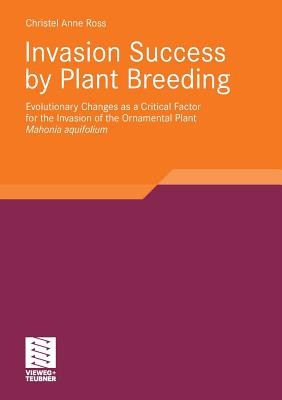
- We will send in 10–14 business days.
- Author: Christel Ross
- Publisher: Vieweg+Teubner Verlag
- Year: 2009
- Pages: 105
- ISBN-10: 3834807923
- ISBN-13: 9783834807922
- Format: 14.8 x 21 x 0.7 cm, minkšti viršeliai
- Language: English
- SAVE -10% with code: EXTRA
Reviews
Description
Invasive species are a major threat to global biodiversity and cause significant economic costs. Studying biological invasions is both essential for preventing future invasions and is also useful in order to understand basic ecological processes.
Christel Ross investigates whether evolutionary changes by plant breeding are a relevant factor for the invasion success of Mahonia aquifolium in Germany. Her findings show that invasive populations differ from native populations in quantitative-genetic traits and molecular markers, whereas their genetic diversity is similar. She postulates that these evolutionary changes are rather a result of plant breeding, which includes interspecific hybridisation, than the result of a genetic bottleneck or the releases from specialist herbivores.EXTRA 10 % discount with code: EXTRA
The promotion ends in 21d.05:52:59
The discount code is valid when purchasing from 10 €. Discounts do not stack.
- Author: Christel Ross
- Publisher: Vieweg+Teubner Verlag
- Year: 2009
- Pages: 105
- ISBN-10: 3834807923
- ISBN-13: 9783834807922
- Format: 14.8 x 21 x 0.7 cm, minkšti viršeliai
- Language: English English
Invasive species are a major threat to global biodiversity and cause significant economic costs. Studying biological invasions is both essential for preventing future invasions and is also useful in order to understand basic ecological processes.
Christel Ross investigates whether evolutionary changes by plant breeding are a relevant factor for the invasion success of Mahonia aquifolium in Germany. Her findings show that invasive populations differ from native populations in quantitative-genetic traits and molecular markers, whereas their genetic diversity is similar. She postulates that these evolutionary changes are rather a result of plant breeding, which includes interspecific hybridisation, than the result of a genetic bottleneck or the releases from specialist herbivores.

Reviews